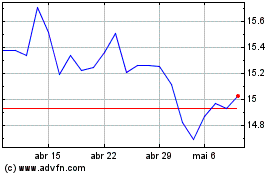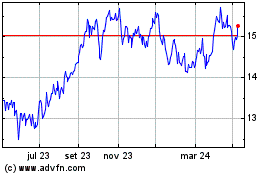By Sarah Kent in London and Eric Sylvers in Milan
Royal Dutch Shell PLC's top executives last year were worried
that a controversial Nigerian oil deal may have violated a U.S.
Justice Department agreement with the Anglo-Dutch oil giant and
would spark an American probe, according to a recorded phone call
between the firm's chief executive and top finance officer at the
time.
The company is already under investigation in Italy, Nigeria and
the Netherlands for a $1.3 billion deal in 2011 with Italian oil
firm Eni SpA and the Nigerian government for a lucrative Atlantic
Ocean oil license known as OPL 245, according to Italian court
documents, Nigerian public records and a statement from the Dutch
prosecutor. The controversial oil block -- believed to contain
billions of barrels of crude -- is a valuable prize for the two
companies, which already pump huge volumes from oil-rich
Nigeria.
The Justice Department declined to comment.
Italian prosecutors are pursuing criminal charges against Shell
and Eni, saying in court records the companies knew the deal's
proceeds would be used to pay bribes in Nigeria. Shell and Eni said
Friday they paid the Nigerian government for the oil block but
didn't believe the money would ultimately be used for bribes. Court
documents allege the money went to various executives and Nigerian
government officials. An Italian judge has yet to rule on whether a
criminal trial will take place.
The phone call between Shell Chief Executive Ben van Beurden and
then-CFO Simon Henry opens a rare window into the private
conversations of the company's top executives and reveals how the
Nigeria bribery investigation has become a nagging worry. On the
call, they say they are speaking just hours after Dutch police
raided Shell's offices in The Hague in February 2016 as part of an
investigation into the deal.
In response to questions about the call, a Shell spokesman said
the company notified U.S. and U.K. authorities about the raid and
subsequently turned over the results of its own internal
investigation into the Nigerian oil deal to them. Shell said it is
cooperating with authorities but doesn't believe there is a basis
for the Italian prosecution. The company didn't dispute the
authenticity of the recording.
On the call, Mr. van Beurden told Mr. Henry that the company's
legal team conducting their own investigation had turned up
"unhelpful email exchanges" with "loose chatter" from Shell
employees about the Nigeria deal, according to a recording heard by
The Wall Street Journal that was provided by a person in possession
of the recording.
The emails, Mr. van Beurden said on the call, included "things
like 'Well, yeah, you know, I wonder who gets a payoff here' and
whatever."
BuzzFeed reported the call on Sunday.
Mr. van Beurden said on the call that he didn't believe
investigators had found anything incriminating, but he and Mr.
Henry wondered whether the Justice Department was working with the
Dutch police.
"Apparently it was judged to be, you know, just pub talk in
emails, which was stupid, but nevertheless, it's there," he told
Mr. Henry. Later in the call, Mr. van Beurden said Shell concluded
the U.S. wasn't involved in the Dutch raid.
Mr. van Beurden, who took over as CEO in 2014 and wasn't
involved in the OPL 245 deal, expressed concern that his
predecessors hadn't disclosed enough about the deal to the U.S.
Justice Department. The Justice Department had already investigated
Shell for Nigeria bribery allegations in a separate case and
entered a deferred prosecution arrangement with the company in 2010
requiring a $30 million criminal settlement and adherence to what
the Justice Department called "enhanced corporate compliance and
reporting obligations."
"We should have maybe at the time been more open with the DOJ
than we now find we have been," Mr. van Beurden said on the phone
call, referring to the bribery allegations arising from the
subsequent 2011 OPL 245 deal.
The U.S. has been a tough enforcer of anticorruption laws and
has used the Foreign Corrupt Practices Act to levy huge fines
against international companies.
The U.K.'s Serious Fraud Office wouldn't confirm or deny its
interest in the case. The Dutch Public Prosecutor said Sunday it is
working on a joint investigation with Italian authorities into
whether Shell bribed Nigerian officials, but wouldn't comment on
the Shell executives' conversation. Italian prosecutors didn't
respond to requests for comment.
Shell pursued the rights to OPL 245 for years before joining
with Eni to strike the complicated 2011 deal now under
investigation. Under the $1.3 billion arrangement, Eni put $1.1
billion into an escrow account for the Nigerian government.
In internal Shell emails obtained by nonprofit Global Witness
and reviewed by the Journal, Shell's executives and managers in
Africa show the deal was being structured so the government would
send the escrow money to a company called Malabu Oil and Gas, which
was linked to former oil minister Dan Etete, according to court
documents. The deal was intended to settle years of wrangling over
the block's ownership.
London-based Global Witness has conducted an investigation into
Shell's oil deal with Finance Uncovered, a group of investigative
reporters and campaigners. Italian prosecutors in court records say
Mr. Etete's company then used the money for bribes, with the
knowledge of the Nigerian government, Shell and Eni. Malabu
couldn't be reached for comment.
Nigeria's then-President Goodluck Jonathan "is motivated to see
245 closed quickly -- driven by expectations about the proceeds
that Malabu will receive and political contributions that will flow
as a consequence, " Shell manager Peter Robinson said in an August
2010 briefing sent to Malcolm Brinded, then head of exploration and
production.
Oil-industry corruption allegations helped lead to Mr.
Jonathan's defeat in 2015. Mr. Jonathan has previously denied the
bribery allegations in a statement. Attempts to reach Messrs.
Etete, Robinson and Brinded were unsuccessful.
"This is one of the worst corruption scandals the oil industry
has ever seen," said Simon Taylor, director of Global Witness.
--Aruna Viswanatha in Washington contributed to this
article.
Write to Sarah Kent at sarah.kent@wsj.com and Eric Sylvers at
eric.sylvers@wsj.com
(END) Dow Jones Newswires
April 10, 2017 02:47 ET (06:47 GMT)
Copyright (c) 2017 Dow Jones & Company, Inc.
Eni (BIT:ENI)
Gráfico Histórico do Ativo
De Mar 2024 até Abr 2024

Eni (BIT:ENI)
Gráfico Histórico do Ativo
De Abr 2023 até Abr 2024
